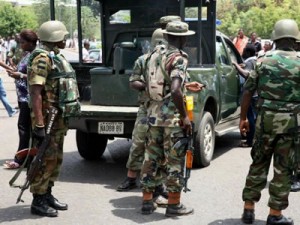Militarism On The Nigerian Psyche By Obinna Chukwuemeka
Since the advent of the first military coup on January 15, 1966, Nigeria had gone through several coups and counter-coups carried out by military officials until the return to democratic rule on May 29, 1999. During this period, Nigerians faced and were confronted with draconian policies and laws mostly issued through decrees under repressive military regimes. Democratic ideals were rolled back and stifled, leading to gross abuse fundamental human rights, dissolution of the parliament, curtailment of press freedom, subjugation of trade unions and civil society organizations, abolition of political parties and pressure groups, power centralization, absolute rule as well as the removal of power checks and balances.
Due to the longer period of military rule which lasted for some inconsecutive years, the Nigerian society have been plagued by the negative impact of dictatorship. The psyche and mindset of most Nigerians have been tainted by past experiences of repressive regimes. Military rule left behind a military-oriented society whereby people erroneously believe that addressing unfolding situations and challenges within the state can always be confronted and tackled through military means. It is not difficult to observe the military language frequently used by Nigerians when analyzing problems with suggestions to facing those problems. The use of the term “brute force”, “war”, “threat”, “subjugation” and a host of others are mostly associated with their regular arguments, opinions and thoughts in contribution to national and political discourse. Due to the arbitrary practices carried out by autocratic regimes spanning years, Nigerans were engrained with military mindset in the absence of well-established cultural democracy.
Cultural democracy inspires active participation in community cultural life; assures fair and equal access to resources and support, enables people to partake in policy decisions affecting quality of our lives as well as promoting our diversity in a multicultural and multi religious country.
In the contemporary society, the evaluation of critical situations and problems from a military approach is very much rampant today amongst citizens. One can easily trace the root cause of this lingering problem which stemmed from decades old military governments. The use of coercion, threat, suppression, instillment of fear and intimidation by past and present governments have often proven unsuccessful in confronting challenges facing the country. Several reoccurring problems such as militancy, Fulani herdsmen attacks, ethnic agitations, separatism as well as insurgency cannot be resolved quickly with brute force. While democratic norms pave way for dialogue and diplomacy, military approach emphasizes the language of force and suppression.
Most people barely exercise their civic rights to peaceful protests, criticizing government elites or seeking justice on the second thought of fear of oppression and intimidation by governments that abuse democratic norms by using forceful tactics to subdue their citizens. The mindset among the people is that the government of the day is ready and fully prepared at any point in time to use coercive means to quell uprising and peaceful demonstrations. Nigerians seem to be ensnared on the military mindset they harbor deeply. Looking at the leadership in the country, it is hard to imagine how this cycle will break with the frequent return of former dictators into power and leadership positions in democratic era.
Nevertheless, the Nigerian society requires sensitization on democratic ideals that will free will, equity, fairness and justice. There is the necessity to strengthen democratic institutions to curtail deep-seated military mindset harbored by civilians.
Obinna Chukwuemeka .P. Can be reached at ocpaschal@gmail.com


Comments
Post a Comment